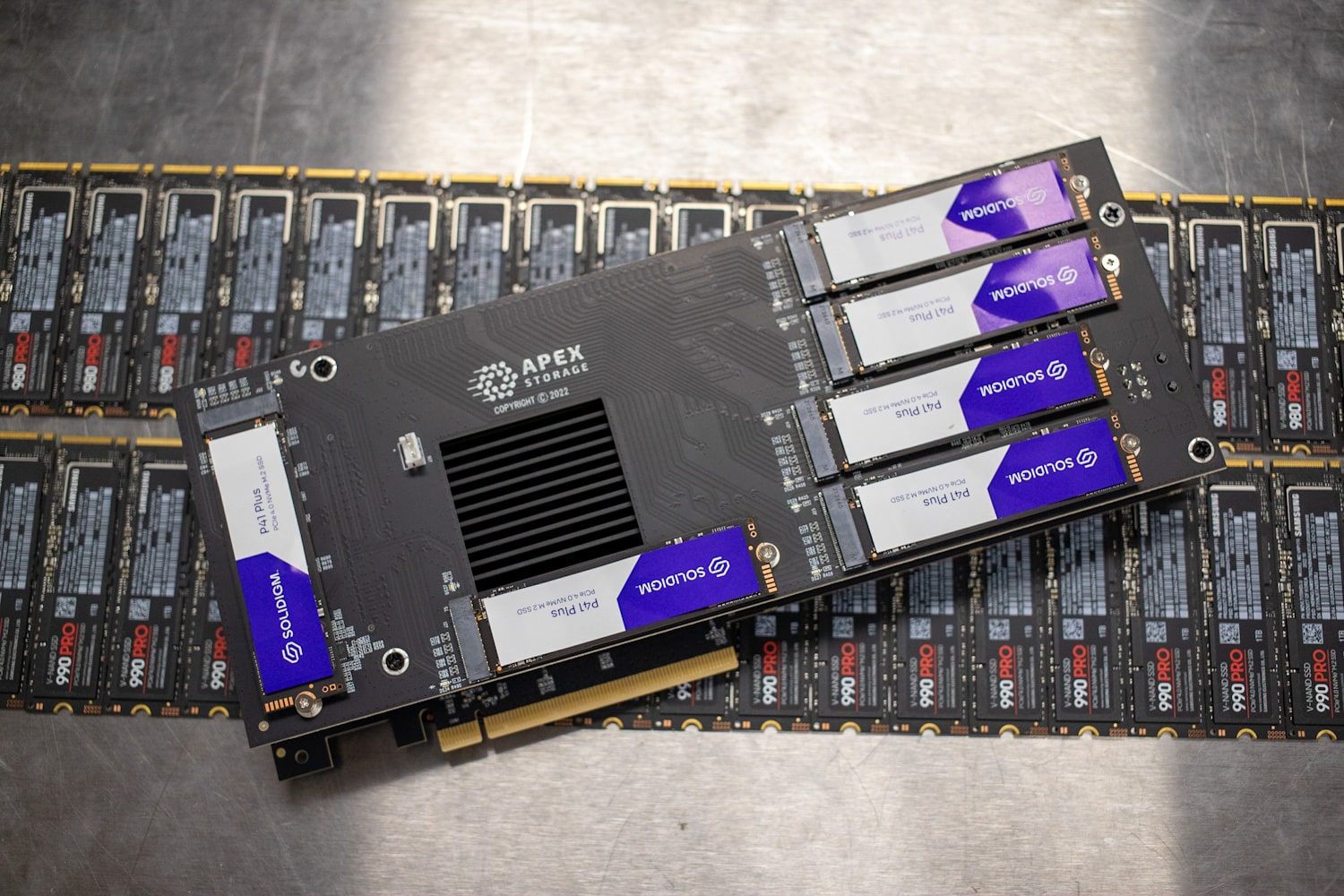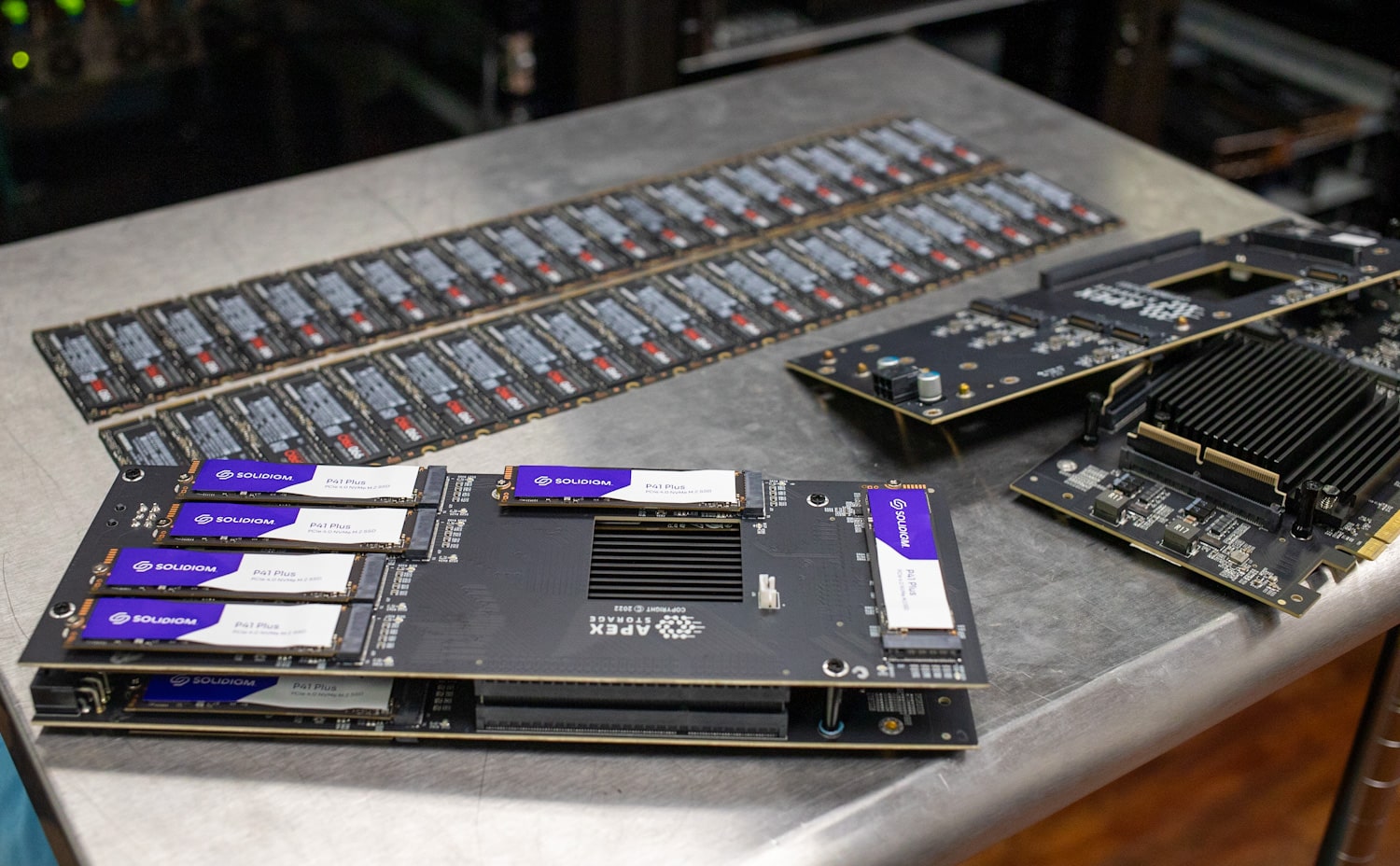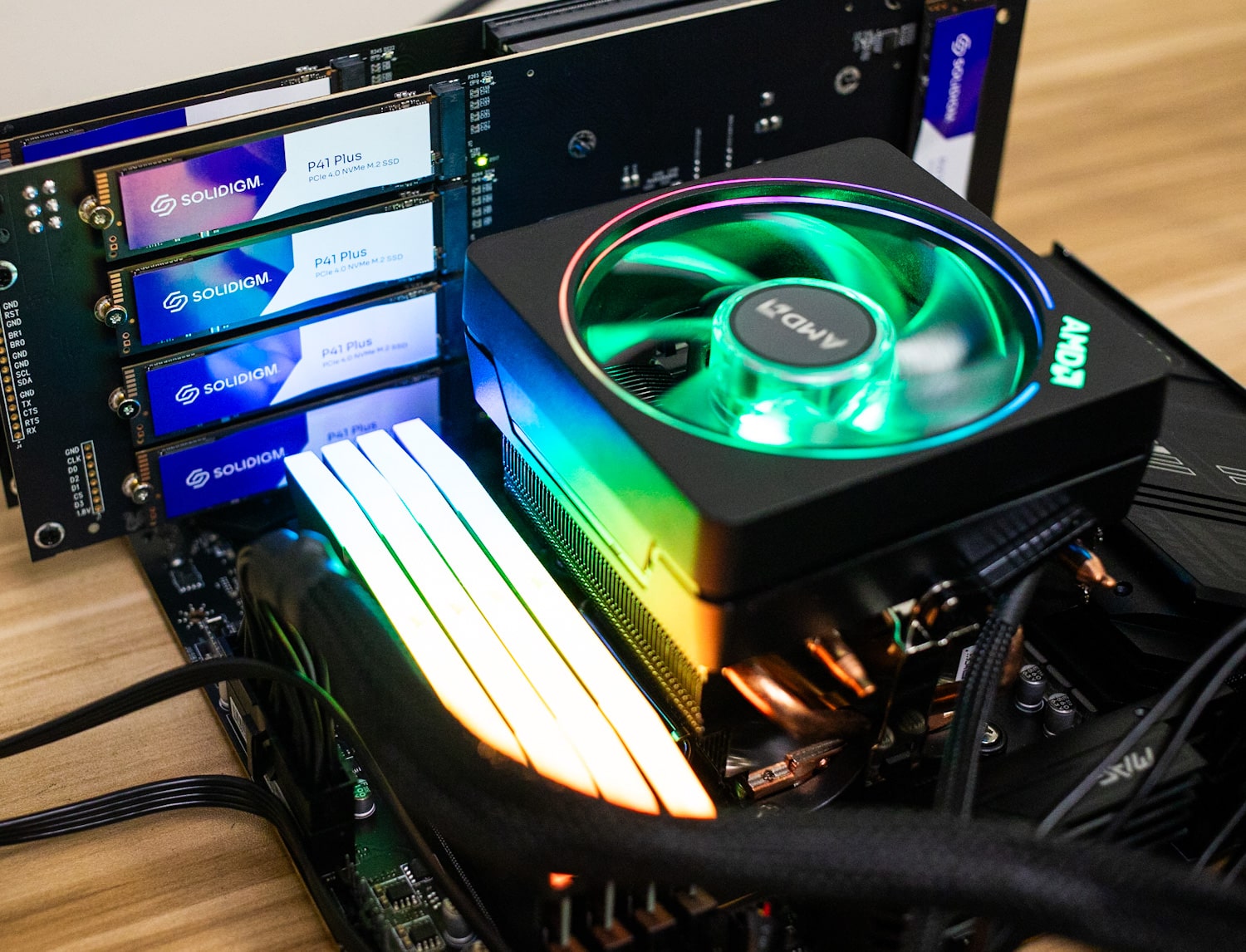The Apex Storage X21 21 SSD board is truly a force to be reckoned with. We initially reviewed the system in May of this year, Apex Storage X21 Review: The Roaring Twenty-Ones. The device was a resounding success in our testing with the Samsung 980 Pros we put into the system. We were so impressed that we are testing it again, except with two different SSDs, the 1TB Samsung 990 Pros, and the 1TB Solidigm P41 Plus.
The Apex Storage X21 21 SSD board is truly a force to be reckoned with. We initially reviewed the system in May of this year, Apex Storage X21 Review: The Roaring Twenty-Ones. The device was a resounding success in our testing with the Samsung 980 Pros we put into the system. We were so impressed that we are testing it again, except with two different SSDs, the 1TB Samsung 990 Pros, and the 1TB Solidigm P41 Plus.

The first time around, the numbers were super impressive, with 28.3GB/s and 28.7GB/s off the card in the 8K random read and write, respectively. Our small-block write in our 4K Fio test topped out at 6.8M IOPS read and 5.3M IOPS write. The smaller blocksize testing is when we started to hit the limits of the 980 Pros. We were pushing 23M IOPS in a 512-byte random read operation but later dropped to 14.6M IOPS once the drives were filled.
Replacing the Samsung 980 Pros with Samsung 990 Pros should alleviate any performance shortcomings the 980 Pros exhibited. Even better, the 990 Pro pricing just fell rapidly, it’s now just $80 for the 1TB, the same as the 980 Pro. On the other side of the value chain, we’re also testing the Solidigm P41 PLus QLC SSDs.
We imagine some may wonder why we are pitting the Solidigm P41 Plus against drives clearly out of its class. Our reasoning is simple; the Solidigm P41 Plus is shadowed by both drives in performance but not price. For users on a budget, the 1TB version goes for $39.99 on Amazon. And to foreshadow what you’ll see below, the drives hang really well in many sequential workloads.
The Apex Storage X21 is priced at $2800 as a single unit (without drives), with volume pricing and custom orders available.
Apex Storage X21 Specifications
| Raw Capacity | 168TB w/ 8TB M.2 NVME SSDs (336TB w/ future 16TB M.2 SSDs) |
| Drive Interface | M.2 PCIe Gen 4 |
| Read Bandwidth | 30.5 GBps (107+ GBps Multicard) |
| Write Bandwidth | 28.5 GBps (80+ GBps Multicard) |
| Read/Write IOPS | 10 Million + |
| Read Access Latency | 79us avg. |
| Write Access Latency | 52us avg. |
| Host Protocol | PCIE Gen 4 16x |
| M.2 Protocol | Gen 4 NVME v2.0/v1.4c |
| Warranty | Lifetime |
| Weight | 19 oz |
| Power | Active: ~95 Watt Typical 2 x PCI-e 6 pin 12v |
| Air Flow | Min 400 LFM |
| Humidity | 5% to 95% (non-condensing) |
| Supported OS | Windows, Windows Server, Linux |
Apex Storage X21 Performance
To keep things consistent between the three SSD sets of SSDs, we leveraged the same equipment for all our testing. We utilized an AMD-based MSI X670E Motherboard with an AMD Ryzen 9 7950X 4.5GHz, 16-core CPU. This platform included 64GB of DDR5 memory and, for the duration of the review, leveraged integrated graphics only.
SSDs In Question:
- 21x Samsung 980 Pros
- 21x Samsung 990 Pros
- 21x Solidigm P41 Plus
Fio Workload Testing
To test the three groups of SSDs, we used a Debian OS test environment for our Fio workloads. Fio supports the newer io_uring I/O protocol, which enables lower-latency, high-throughput testing. We stick to Fio testing in this comparison because we aim to see what Apex Storage X21 can do at the absolute maximum with each set of drives.
Here our focus is showing the absolute peak I/O and bandwidth possible through the card. Before these tests were performed, each SSD was formatted and then completely filled.
21x Samsung 980 Pros (1TB)
| Workload | Throughput (IOPS) | Bandwidth (GB/s) |
|---|---|---|
| 512-byte Random Read | 14.6M IOPS | 7.477GB/s |
| 512-byte Random Write | 3.421M IOPS | 1.751GB/s |
| 4K Random Read | 6.832M IOPS | 28GB/s |
| 4K Random Write | 5.274M IOPS | 21.6GB/s |
| 8K Random Read | 3.454M IOPS | 28.3GB/s |
| 8K Random Write | 3.499M IOPS | 28.7GB/s |
We took this data from our original review of the Apex Storage X21. The Samsung 980 Pro configuration did well with the Apex Storage X21. This SSD is our control variable since we have already tested it. Hence, we will see how the other drives perform against this baseline. Our full review of the Apex with the 980 Pro configuration can be found here: Apex Storage X21 Review: The Roaring Twenty-Ones.
21x Samsung 990 Pros (1TB)
| Workload | Throughput (IOPS) | Bandwidth (GB/s) |
|---|---|---|
| 512-byte Random Read | 17.0M IOPS | 8.708GB/s |
| 512-byte Random Write | 3.159M IOPS | 1.617GB/s |
| 4K Random Read | 6.861M IOPS | 28.1GB/s |
| 4K Random Write | 5.497M IOPS | 22.5GB/s |
| 8K Random Read | 3.345M IOPS | 27.4GB/s |
| 8K Random Write | 3.501M IOPS | 28.7GB/s |
The Apex Storage X21 did better with the Samsung 990 Pros, showing increased performance in most categories. Its increase in performance from the 980 Pro in 512-byte Random Read is the most notable metric, with an increase of 2.4M IOPS. The other metrics did not see much change in performance but are still worth mentioning.
4K random read and write saw slight increases. 4K random read-only saw a 0.1GB/s increase, and 4K random write had a more notable 0.9GB/s increase. 8K random write was also higher with the 990 Pros, but with a difference of only two thousandths in IOPS, it’s so minimal that it’s safe to assume the performance is the same between the two drive configurations.
512-byte random write, 8K random read saw a slight decrease in performance when switching over to the more powerful 990 Pros. Although the decreases were small, 512-byte random write and 8K random read saw downturns of 0.134GB/s and 0.9GB/s, respectively.
21x Solidigm P41 Plus (1TB)
| Workload | Throughput (IOPS) | Bandwidth (GB/s) |
|---|---|---|
| 512-byte Random Read | 4.931M IOPS | 2.524GB/s |
| 512-byte Random Write | 0.378M IOPS | 0.194GB/s |
| 4K Random Read | 4.863M IOPS | 19.9GB/s |
| 4K Random Write | 5.261M IOPS | 21.6GB/s |
| 8K Random Read | 3.36M IOPS | 27.5GB/s |
| 8K Random Write | 3.219M IOPS | 26.4GB/s |
To test the QLC-based Solidigm P41 Plus, we adjusted the testing process to focus the workload into a 1 percent partition on the drive, putting stress on the SLC cache. While it is not in the same class as the Samsung 980 Pro or 990 Pro, it becomes one of the most interesting options when you look at the total build cost. At just $39 per 1TB drive, you are looking at $819 in 21TB of flash cost, compared to over $1,650 with the 990 Pro as of today.
The QLC flash was easily bested by the Samsung drives in 512-byte random read and write. The Solidigm P41 saw 512-byte bandwidth as 2.524GB/s read and 0.194GB/s write. This is much slower than the Samsung 980 Pros read and write bandwidth of 7.477GB/s and 1.617MB/s for instance.
4K random reads and writes is where things start to get interesting. The Solidigm P41 had a 4K read speed of 19.9GB/s and a write speed of 21.6GB/s. This is lower than the Samsung 980 Pros numbers of 28.1GB/s and 22.5GB/s, but we can see the gap closing in this metric compared to 512-byte read and write. When considering we’re testing one of the most cost-effective SSDs on the market, getting 4.9M IOPS 4K random read and 5.3M IOPS 4K random write out of them in aggregate is nuts.
8K random read and write saw the Solidigm P41 Plus vastly improve in comparison to the other drives. The P41 Plus posted read bandwidth of 27.5GB/s and a write of 26.4GB/s. These are just under where the Samsung Pros came in. Interestingly, the Solidigm beats the Samsung 990 Pro configuration in 8K random read by just 0.1GB/s. Getting 27.5GB/s from a QLC-based consumer SSD flash pool is incredible.
Final Thoughts
The Apex Storage X21 is a beast in terms of performance; the sheer amount of power this card can hold is no joke. The client SSDs all did fantastic with all the configurations we tasked them with.
The Samsung 990 Pro configuration saw overall increases in terms of performance compared to the Samsung 980 Pro config. This was especially prevalent in 512-byte random read performance, with an increase of 2.7M IOPS from the 980 Pros 14.6M to the 990 Pros 17.0M. Most of the other metrics saw slight gains in performance but were still in a similar range as the 980 Pros’ performance, even though they were a bit higher. 512-byte random write and 8K random read saw slight downturns in performance.
The QLC-based Solidigm P41 Plus SSDs were the most fun to test. While they performed in the range we were expecting, seeing their incredible bandwidth numbers (even better when figuring MB/s per dollar) in aggregate puts a smile on our faces. Users looking at the Apex Storage X21 should definitely work to understand their workload to ensure they’re not overpaying for performance they may not need.
With broad SSD compatibility, the Apex X21 lets users choose the exact drive they want for the use case. Ultimately, configurations will vary depending on a user’s needs, but there is no arguing that the Apex Storage X21 is an excellent option for client systems needing incredible throughput or bandwidth. We’re glad to have been able to secure 42 more SSDs to complete this second-round review and have even more in store for this card in store.
That reminds me, my gaming rig Steam library is getting pretty full. I wonder if there’s a better way.
Engage with StorageReview
Newsletter | YouTube | Podcast iTunes/Spotify | Instagram | Twitter | TikTok | RSS Feed



